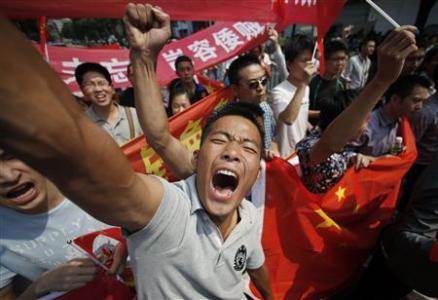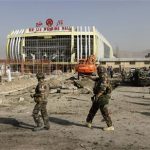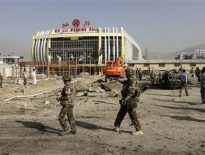(Reuters) – Anti-Japan protests reignited across China on Tuesday, the emotional anniversary marking Tokyo’s occupation of its giant neighbor, escalating a maritime dispute which has forced major Japanese brandname firms to suspend business there.

Relations between Asia’s two biggest economies have faltered badly, with emotions running high on the streets and also out at sea where two Japanese activists landed on an island at the centre of the dispute.
China reacted swiftly to the news of the landing, which risked inflaming a crisis that already ranks as China’s worst outbreak of anti-Japan sentiment in decades. Beijing described the landing as provocative, lodged a complaint with Tokyo and said it reserved the right to “take further action”.
“The unlawful landing of the Japanese right-wingers on the Chinese territory of the Diaoyu islands was a gravely provocative action violating Chinese territorial sovereignty,” Chinese Foreign Ministry spokesman Hong Lei said in a statement.
The dispute over the uninhabited group of islands in the East China Sea – known as the Senkaku in Japan and Diaoyu in China – led to another day of protests that Japanese expatriates fear could peak later on Tuesday.
Japanese businesses shut hundreds of stores and plants across China and Japan’s embassy in Beijing again came under siege by protesters hurling water bottles, waving Chinese flags, and chanting anti-Japan slogans evoking war-time enmity.
“Wipe out all Japanese dogs,” read one banner held aloft by one of thousands of protesters marching on the embassy, which was ringed by riot police standing six rows deep. Japan’s foreign ministry said some embassy windows had been smashed.
“Today is our day of shame,” said another Beijing protester, Wei Libing, a waiter in his 40s. “Japan invaded China on this date.”
Tuesday marks Japan’s 1931 occupation of parts of mainland China.
Rowdy protests sprang up in other major cities including Shanghai, raising the risk they could get out of hand and backfire on Beijing, which has given tacit approval to them through state media. One Hong Kong newspaper said some protesters in southern Shenzhen had been detained for calling for democracy and human rights.
JAPANESE FIRMS HUNKER DOWN
U.S. Defense Secretary Leon Panetta, visiting China to promote stronger Sino-U.S. military ties, again called for calm and restraint. Washington has said it will not take sides, although it is a strong ally of Japan.
China said it wanted a peaceful outcome. “We still hope for a peaceful and negotiated solution to this issue and we hope to work together and work well with the Japanese government,” Defence Minister Liang Guanglie said after meeting Panetta.
Well-known Japanese firms have been targeted by protesters, with car makers Toyota Motor Corp and Honda Motor Co halting some operations after attacks on their outlets.
Other Japanese companies — from Mazda and Mitsubishi Motors to Panasonic and Fast Retailing — also shut plants and stores in China, sending Japanese share prices falling and prompting a warning from credit rating agency Fitch that the situation could hurt some auto and tech firms’ creditworthiness.
Some firms recalled workers back to Japan due to the unrest.
“The situation on the ground in China is not so good and I was advised by the locals not to go out. I couldn’t get any work done,” Japanese expatriate worker Hisato Takase said on arrival at Tokyo’s Haneda airport.
Japanese restaurants, a common target of protesters, barred their doors while many Japanese expatriates stayed home.
Tuesday’s brief landing by two Japanese nationals on one of the disputed islands, reported by Japan’s coast guard, has raised fears of a direct clash in an area being patrolled by ships from both nations.
The activists briefly landed on one of the islands, having paddled up to it in a rubber raft and swum ashore before returning to the boat, Japanese broadcaster NHK said.
A flotilla of around 1,000 Chinese fishing boats is also reported by Chinese and Japanese media to be heading to the area, which contains potentially large gas reserves.
In 2010, a bilateral crisis over the islands erupted after a fishing boat collided with a Japanese Coast Guard vessel.
The Japanese government has set up an information-gathering operation to monitor the movements of the Chinese fishing boats.
The long-standing territorial dispute bubbled over again last week when the Japanese government decided to nationalize some of the islands, buying them from a private Japanese owner.
Political analysts say China also upped the stakes last week when it announced precise boundaries for waters it claims around the islands, a move sure to raise pressure on Beijing to act when it accuses Japanese vessels of violating those boundaries.
The dispute has sent China-exposed Japanese stocks down heavily on the Tokyo stock market, raising concerns about any wider impact on economic and trade ties between the two countries. Platinum prices also fell, partly on the disruption to Japanese car plants in China, traders said. The precious metal is used as an auto catalyst.
China, the world’s second-largest economy, and Japan, the third-largest, have total two-way trade of around $345 billion.
There is no talk of Japanese firms withdrawing investment from China but some experts believe anti-Japan sentiment could prompt firms to rethink China investments in the longer term.
(Additional reporting by Kiyoshi Takenaka, Tim Kelly, Linda Sieg and Hern Shinn Cheng in TOKYO, Kazunori Takada, John Ruwitch and Carlos Barria in SHANGHAI, James Pomfret in GUANGZHOU, and Max Duncan and Chris Buckley in BEIJING; Writing by Mark Bendeich; Editing by Nick Macfie)





